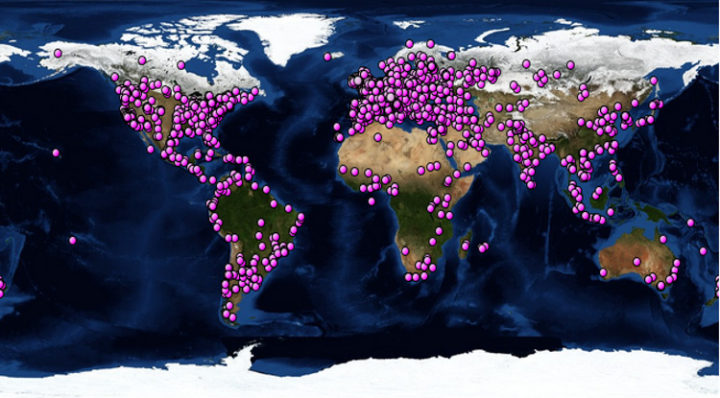For the last couple of weeks, Pressenza has been collaborating with The Rosetta Foundation, an Irish NGO which created an open translation platform, Trommons. The Foundation aims to provide equal access to information by translating non-commercial projects into a wide variety of languages. This is a collective interview with The Rosetta Foundation’s staff.
When was The Rosetta Foundation founded? Who created it and how?
The Rosetta Foundation was launched on September 21, 2009, at the Action for Global Information Sharing (AGIS) ’09 Conference in Limerick, Ireland, by the President of the University of Limerick, Professor Don Barry. The Foundation was the brainchild of Reinhard Schäler, head of the Localisation Research Centre (LRC) at the University of Limerick, and a leading advocate against disenfranchisement due to language. The Foundation was a spin-off of the LRC and the Centre for Next Generation Localisation (CNGL), a research initiative supported by the Irish government, Irish universities, and industrial partners. Its primary purpose is to make information available to individuals all over the world irrespective of their social status, linguistic or cultural background, and geographical location.
Our name is based on the Rosetta Stone. In 196 BC, the text of the Rosetta Stone was carved in Egyptian and Greek using three scripts – Hieroglyphic, Demotic and Greek. The Rosetta Stone was written in these scripts to make sure that everyone in the world at the time could understand it. The Stone was discovered in 1799 in a small Egyptian village called Rosetta, which gave the stone its name.
Like the Rosetta Stone, the aim of The Rosetta Foundation is to provide equal access to information to as many people as possible. We believe access to information in your own language is a fundamental and universal human right – one that The Rosetta Foundation is committed to preserve and protect.
What is your mission?
Relieve poverty, support healthcare, develop education and promote justice through equal access to information and knowledge across the languages of the world.
When was the platform www.trommons.org created?
In 2013, The Rosetta Foundation developed a unique, web-based Translation Commons (Trommons) to connect directly communities that needed translation and volunteers who could provide it.
The Translation Commons connects a large pool of language volunteers ready to supply their services free-of-charge to communities who require them most, matching non-profit projects with the skills, experience and interests of volunteers. Volunteers on Trommons currently cover over 200 languages.
Can you give us some numbers, stats about languages, projects,…?
Last year our volunteers completed over 2,700 new projects on our platform and this figure has nearly doubled in 2016. As for the Trommons community, over 15,500 volunteers from all over the world are registered on our platform, offering their skills to 341 non-profit organisations. You can see an active map of Trommons activity all over the world on the website (www.trommons.org).
Since inception, The Rosetta Foundation has provided 16 million multilingual words to needy recipients.
Is there a specific project you are particularly proud of?
Our collaboration with Cultural Survival comes to mind. The projects involved the translation of radio transcripts on Free, Prior and Informed Consent for indigenous communities into 53 languages.
The right of Free, Prior and Informed Consent means that indigenous communities have the right to decide whether they want companies or governments to mine, deforest, or in other ways develop their lands. However, many indigenous societies do not know they have this right and do not speak the languages of the government representatives or corporations that come to exploit their resources. Our Foundation’s work allowed those communities to know and assert their right for the very first time.
We also work on a continuous basis with such incredible organisations as Special Olympics, Les petits frères des Pauvres, Capacitar International, and many many more.
http://www.therosettafoundation.org/participate/organisations/
Trommons works thanks to the volunteers coordinated by a small team and it relies exclusively on donations, right?
Yes, we are financed by donations from The Rosetta Foundation community and translation companies, such as Conversis Global, Xlated, and Welocalize. The energetic core of our efforts is the endless generosity of our volunteers, who donate their time and skills every day. We could not possibly do this valuable work without them.
What does it feel like working mostly with volunteers?
It feels fantastic and rewarding! The vast majority of volunteers are 100% reliable and accurate in their work, and this is something that we never take for granted. We are so respectful and even in awe of our volunteers and their work because we know they they have day jobs, families and busy lives, and yet they still volunteer many hours a week for our projects in their free time.
What are your perspectives for the future?
Our non-profit partner organisations are so happy and grateful for the work that the Foundation does and the quality provided by the volunteer translators. The multilingual information we facilitate makes a real difference in people’s lives. But the reality is that nearly three-quarters of the world’s population still has no access to vital information in their own language. The Rosetta Foundation will continue working hard on their behalf in 2017 and beyond, because access to information in your own language is a fundamental human right.






